The Art of Comedy
Associate Professor of Drama Shona Tucker uses classics works by Molière, Shakespeare, and Ionesco, the ancient art of mime, and other physical comedy to preach the importance of being silly.

One key to comedy is realizing there’s nothing wrong with being silly. But the real secret is learning how to ratchet “silly” up a notch.
In her class the Art of Acting: Comedy, Shona Tucker—a Schomburg Fellow, Fulbright Scholar, and veteran of stage and screen—uses mime and the works of Molière, Shakespeare, Ionesco, and Wilde, among others, to teach her students something you might not expect—the importance of being “stoopid.”
“Silly is not at all unimportant in acting. Silly gives you the freedom to roam the stage unencumbered by thought. ‘Stoopid’ is getting your mind out of the way of your acting,” she says.
In one recent class, Tucker had her students perform pre-rehearsed mime scenes that they had created themselves—a shoplifter, an inept yoga student, an elusive fly that refuses to be swatted, a woman dressing herself for the brutally cold weather outside. Then she gave each student a small, red, plastic clown nose and had them improvise as she barked out scenarios: “You have narcolepsy! You love to dance! You’re really, really, really hungry! You’re a fugitive! You really, really have to go to the bathroom!”

Tucker, who has performed at such prestigious venues as New York Theatre Workshop, New York Shakespeare Festival, Circle in the Square, Playwrights Horizons, and American Conservatory Theater, just to name a few, says her overriding advice to her students throughout the class is, “Make big choices. Overact. Commit completely.” She prepares them for this transformation from serious Vassar students to silly, “stoopid” actors or actresses with a series of warm-up exercises. It starts with stretching, moves on to screaming and then to miming acts by tossing multiple beanbags to each other at an increasingly rapid pace. “We’re just clearing our minds of all that serious stuff,” she says.
As she watches the students perform, Tucker offers gentle criticism—“Do it again, bigger!”—and effusive praise—“Voilà! Exactly! Exactly!”
The students taking the class say they’re learning to enjoy the freedom comedic acting affords them. “I needed to take two advanced acting seminars for my drama major,” says Aran Savory ’16. “Shona told me to take the one that was the most scary to me, so here I am. There’s pressure in knowing you have to make people laugh, but you learn that it’s something intuitive; you can’t rely on your intellect to get you there. You have to shut the thinking down and just do it, let it come out.”

Patrick Dunning ’16, also a drama major, says he approached the class with some fear, even though he’s done quite a bit of comedic acting in high school and at Vassar. “It scared me, but it’s energizing too,” Dunning says. “Being a clown was fun. You acquire the persona and let it ride. That little red nose was something to hide behind and to use. It’s both a shield and a weapon.”
For their final project, Tucker’s students are required to perform a “postmodern constructed comedic experience,” and everyone on campus is invited to watch. “I always make the final exam in this course open to the public,” Tucker says. “Comedy is so much more fun when lots of people are watching.”
